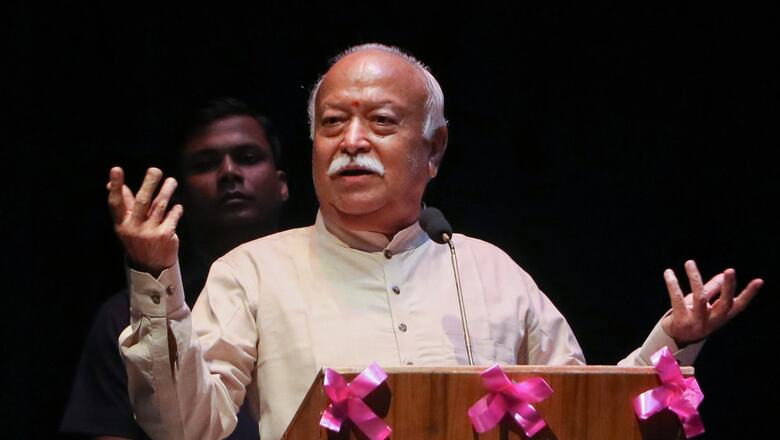
views
‘Reconciliation, security and peace’ are what Hindu-centric Rashtriya Swayamsevak Sangh (RSS) Sarsanghchalak, Mohan Bhagwat articulated while delivering his annual Vijayadashami speech at the organisation’s headquarters in Nagpur. This is at variance with ‘radicalism’ and ‘fundamentalism’ sought to be attached to Hindus and RSS by self-styled ‘liberal minds’, conspiracy theorists and those opposed to Bharat’s unity. RSS chief’s Dussehra speech is widely recognised in Bharat and internationally as a firm indicator of the organisation’s outlook towards issues, happenings and unfolding developments on the socio-economic and political front.
‘Sulah, Salamati & Aman’ is what Mohan Bhagwat pushed for with diverse communities that form larger Bharat’s society. Bhagwat appealed for reconciliation, security and peace against discord, strife and violence (fitna, fasad & kitan) to realise the vast breadth of unity in diversity that Bharat’s 1.4 billion population has been known for millennia.
The use of Arabic and Persian root words by the RSS chief to drive home the point of unity rising above differences seems a firm signal to over 210 million Muslims in India and their counterparts around the world, especially the Sunnis that eye RSS and Hindus with suspicion and distrust. His reference to Christians and other minorities that may have differences with Hindus is again significant given the ‘tolerant, embracing attitude’ of Bharat’s citizens to all those who made this country their home.
There was very little or no mention of the RSS chief’s reconciliatory note in Bharat’s media or dispatches of foreign writers. Forging unity by rising above selfish and divisive tendencies disrupting Bharat’s growth seems to be the central theme of the RSS chief’s speech. RSS’s appeal for forging unity as a ‘mantra’ is refreshing and assuring given the false propaganda unleashed by Bharat’s rivals on reported Muslims ‘genocide’ or Christians being targeted post-2014.
A couple of Christian and Muslim organisations have been propagating globally on their being targeted by RSS, BJP and Modi government, in that order. Sangh chief spoke for his organisation unequivocally and in plain terms that RSS does not believe in such an agenda. Playing victimhood, looking at each other with suspicion and seeking political dominance have been identified as three big evils that come in the way of achieving unity. RSS chief also made it clear that his push for unity did not tantamount to a ‘ceasefire’ between the so-called warring parties. It was the RSS chief’s way of reflecting on cultural continuity, unity and vast diversity.
Rightly so, RSS targeted ‘cultural Marxists’ and ‘woke’ that have sought to dominate the narrative and peddle confusion, chaos and corruption through deceitful means to meet selfish ends and discriminatory attitudes. RSS chief came down heavily on these elements that promoted anarchy and indiscretion in public life as individuals and groups.
A lot of what Mohan Bhagwat said makes sense when one looks at disruptive campaigns, ‘toolkits’ and physical demonstrations that are done by anti-Hindu conglomerations that are indoctrinated by misplaced Marxism, jihad, evangelism and of all, extremism and violence that breed divisiveness. A case in point is the aggressive, violent and extremist minority Khalistani elements in an otherwise calm and quiet larger Sikh community. These vocal groups and individuals, not very large in numbers in Bharat, UK, US, Canada and Europe have threatened to derail perception about Bharat globally.
The line of conciliation and message of unity propounded by RSS chief Mohan Bhagwat is significant given that Bharat is celebrating 75 years post-adoption of the country’s constitution and in 2025, RSS turns 100 years old with the rich legacy of its founders Dr Keshav Baliram Hedgewar and his successor, Madhav Sadashivrao Golwalkar.
Sangh’s message of unity cannot be more apt given the challenges that Bharat faces within and outside as a country. There’s no denying that this unity should also be the driving force for Bharat to provide leadership globally, especially after an eventful G20 Presidency, forging bilateral and regional pacts with equanimity at the centre.
RSS chief seems to have exercised huge restraint in his commentary on the Russian onslaught of Ukraine and Hamas terror attack on Israel that have led to ‘conflicts’ which will have a disruptive impact on humanity and economic recovery that’s nascent post-Covid. Briefly, the RSS chief referred to the basic tenets of Sanatan Dharma as the guiding principles that shaped the Hindu way of life. He seems to have exercised a lot of restraint in calling out the likes of Tamil Nadu’s first political family that view Sanatan Dharma as ‘dengue’ and ‘malaria’ to be weeded out.
One issue that’s dear to Hindus on which the RSS chief came out unambiguously is the ‘grand’ Ram temple to house Ram Lalla at Ayodhya whose consecration has been scheduled for January 22 next year. RSS and like-minded organisations view the Ram temple as a ‘unifying factor’ for all citizens in Bharat transcending caste, creed, sex, region and faith. His call for holding programmes that send out a strong message of unity across Bharat and globally is an extension of his extrapolation to rise above narrow mindset.
The Author is Director & Chief Executive of New Delhi based non-partisan think tank, Centre for Integrated and Holistic Studies. Views expressed in the above piece are personal and solely that of the author. They do not necessarily reflect News18’s views.

















Comments
0 comment